Finally, my top 10 for the year. Okay, so I’m a conservative old fart…but these are the recordings I enjoyed most during the year. I gave most of the more adventuresome stuff to our crackerjack reviewers whom I hope will weigh in with their own choices.
Number One
 Rilke Songs; The Six Realms; Horn Concerto
Rilke Songs; The Six Realms; Horn Concerto
Peter Lieberson
Lorraine Hunt Lieberson mezzo soprano, Peter Serkin, piano
William Purvis, horn, Michaela Fukacova, violoncello
Odense Symphony
Bridge
Lorraine Hunt Lieberson’s untimely death this year adds a bittersweet note to this extraordinary Grammy-nominated recording of husband Peter Lieberson’s settings of five Rilke poems, recorded live at the Ravinia Festival with Peter Serkin at the piano. The two orchestral pieces reveal Peter to be plenty talented in his own right. The Horn Concerto for horn and a chamber orchestra, played by its dedicatee, William Purvis, is a lively 18-minute composition in two movements that showcases Purvis’ virtuosity, not to mention lung capacity. The Six Realms is a 27-minute concerto for amplified cello in six movements, originally composed for Yo Yo Ma. Lieberson is a practitioner of Tibetan Buddhism and The Six Realms travels much the same dark, foggy highway of human consciousness as John Adams’ Dharma in Big Sur although Lieberson’s writing is denser, more complex and less serial. Lieberson’s path is more direct and well-traveled, less risky, perhaps, but more likely to endure.
Number 2
 String Quartets Nos. 2, 3, 4 & 9
String Quartets Nos. 2, 3, 4 & 9
Ben Johnston
New World Records
Any other year, this would have been my first pick. Johnston is a pioneer in the use of microtones and just intonation, surpassing even Harry Partch as a musical maverick. His ten string quartets are among the most fascinating collections of work by any American composer and this album is most have for anyone who cares about modern music.
Number 3
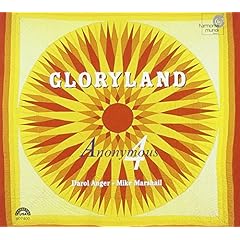 Gloryland
Gloryland
Anonymous 4 with Darol Anger and Mike Marshall
Harmonia Mundi
Appalachian songs of faith and hope sung with passion and amazing grace by the gifted ladies of Anonymous 4. Unlike the New England Presbyterian and Methodist “high church” affirmations of American Angels, these are the songs of tent revivals and roadside tabernacles. The virtuoso fiddle, mandolin and guitar accompaniment of Mike Marshall and Darol Anger add exactly the right note of “high lonesome” authenticity and give Gloryland the joyous sense of music lived, not just performed.
Number 4
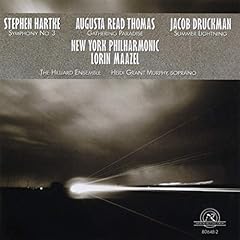 Jacob Druckman, Stephen Hartke, Augusta Read Thomas
Jacob Druckman, Stephen Hartke, Augusta Read Thomas
New York Philharmonic conducted by Lorin Maazel
New World Records
I heard this performance of Stephen Hartke’s Symphony No. 3 (for countertenor, two tenor, and baritone soli with orchestra) on the original radio broadcast in September 2003 and was so haunted by it that I regularly checked over the next couple of years to see if it had been released on CD. The recording holds up so well on second and third hearing that I’m almost reluctant to mention that it is a September 11 remembrance piece commissioned by Maazel because its transcends any particular moment in time. The symphony features the voices of the Hilliard Ensemble with a setting of a poem by an 8th century Anglo-Saxon writer musing on the past splendor of an ancient Roman city now in ruins and is cast in one movement consisting of four smaller sections. It is a haunting and shattering work.
Number 5
 Sibelius, Stravinsky, Ravel: String Quartets
Sibelius, Stravinsky, Ravel: String Quartets
Daedalus Quartet
Bridge
Masterworks by three of the early twentieth century’s greatest composers- Sibelius, Stravinsky and Ravel — played by a remarkable young chamber ensemble who make these durable chestnuts sound as vital and fresh as they were when they were first written. A debut to remember.
Number 6
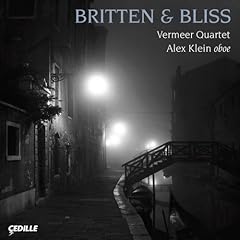 Britten & Bliss
Britten & Bliss
Vermeer Quartet
Alex Klein, oboe
Cedille
The Vermeer Quartet kicks off its farewell tour by joining forces with phenomenal oboist Alex Klein in three pillars of 20th-century British chamber music.
Benjamin Britten’s spellbinding Phantasy Quartet (1932) for oboe, violin, viola, and cello was his first work to gain international recognition. Arthur Bliss’s lovely Quintet for Oboe and String Quartet (1927) deftly blends diverse styles and influences, concluding with an Irish jig.
The final piece is Britten’s last major work, the String Quartet No. 3 (1975), a somber and moving valediction.
Number 7
 Flute Concerto; Violin Concerto; Pilgrims
Flute Concerto; Violin Concerto; Pilgrims
Ned Rorem
José Serebrier, Royal Liverpool Philharmonic Orchestra
Performer: Jeffrey Khaner, Philippe Quint
Naxos
Since his 80th birthday, a steady string of new recordings, mostly from Naxos has caused me to reconsider my impression that Rorem was the Reynoldo Hahn of 1920s Paris. Jose Serebrier, who revealed Rorem’s strengths as a symphonist a couple of years ago with his splendid Naxos recording of the three symphonies, showcases Rorem at three different stages of his career. Pilgrims, a short, somber piece for string orchestra, was written in 1958, not long after Rorem returned from Paris. The Violin Concerto, played eloquently and persuasively here by Philippe Quint, dates from 1984
The real treasure of the disc–the Flute Concerto–was premiered by Jeffrey Khaner, principal flutist of the Philadelphia Orchestra in 2002, who plays it here.
Number 8
 Five Sonatas
Five Sonatas
Andrew Rangell, piano
Bridge
Andrew Rangell has built a reputaton as one of the great living pianists mainly through a series of extraordinary recordings like this one–his fifth for Bridge–and one of his absolute finest. Here are five 20th century sonatas by four of the century’s leading composers–George Enescu, Igor Stravinsky, Leoš Janáček, and Ernesto Halffter, who accounts for two of the sonatas, dated nearly 60 years apart. Rangell’s playing is so highly personal and unconventional, his interpretations so brilliant but quirky, that he is inevitably compared to Glenn Gould, although Rangell is stylistically more adventuresome.
Number 9
 Quartetset; Quiet Time
Quartetset; Quiet Time
Sebastian Currier
Cassatt Quartet
New World Records
Currier’s 1995 Quartetset, written for the Cassett Quartet, is a long (45 minute) seven movement piece that pits tonality versus atonality, dissonance versus consonance, with results that are not only wildy imaginative but surprising listenable. The composer describes it as “a post-modern interpretation of the string quartet.” The same might be said of Quiet Time, another seven movement suite, in which the dialectic is natural versus artifical sound. Quotes from everybody but sounds like nobody else.
Number 10
 Piano Music by Emmanuel Chabrier
Piano Music by Emmanuel Chabrier
Angela Hewitt
Hyperion
The formidable Angela Hewitt takes a vacation from Bach and the results are bright, sunny, atmospheric and downright fun. At the premiere of Dix pièces pittoresques, César Franck said, “We have just heard something extraordinary. This music links our time with that of Couperin and Rameau.” He might also have added, had he known, that the music anticipates Debussy and Ravel. I have probably played this album more than any other this year and I never seem to tire of it.
 The Metropolis Ensemble is getting set to record the complete collection of chamber orchestra concerti of Avner Dorman with producer David Frost but you don’t have to wait to hear it; the best little orchestra in New York will be performing the same repertoire live and in color next Thursday night, October 11, at the Angel Orensanz Foundation Center for the Arts (172 Norfolk St, between Houston and Delancey), commencing at 8 pm. On tap are the American premieres of Dorman’s Concerto in A and Concerto Grosso, the New York premiere of Piccolo Concerto, and an encore performance of Mandolin Concerto. Soloists Mindy Kaufman of the New York Philharmonic, Avi Avital, and Eliran Avni will join the Metropolis Ensemble led by conductor Andrew Cyr. If you haven’t heard the Metropolis in action you’ve missed something pretty special. These cats seriously cook. (Just showing my age for a moment.)
The Metropolis Ensemble is getting set to record the complete collection of chamber orchestra concerti of Avner Dorman with producer David Frost but you don’t have to wait to hear it; the best little orchestra in New York will be performing the same repertoire live and in color next Thursday night, October 11, at the Angel Orensanz Foundation Center for the Arts (172 Norfolk St, between Houston and Delancey), commencing at 8 pm. On tap are the American premieres of Dorman’s Concerto in A and Concerto Grosso, the New York premiere of Piccolo Concerto, and an encore performance of Mandolin Concerto. Soloists Mindy Kaufman of the New York Philharmonic, Avi Avital, and Eliran Avni will join the Metropolis Ensemble led by conductor Andrew Cyr. If you haven’t heard the Metropolis in action you’ve missed something pretty special. These cats seriously cook. (Just showing my age for a moment.) Paul Hersey on piano, and Michael Bowman on trumpet, with the Slovak Philharmonic, conducted by Rastislav Stur.
Paul Hersey on piano, and Michael Bowman on trumpet, with the Slovak Philharmonic, conducted by Rastislav Stur. To bolster that argument, let me point to two new Nielsen releases from DaCapo that have appeared so far this year. The first is a collection of his shorter opera and theater pieces called
To bolster that argument, let me point to two new Nielsen releases from DaCapo that have appeared so far this year. The first is a collection of his shorter opera and theater pieces called  As will
As will 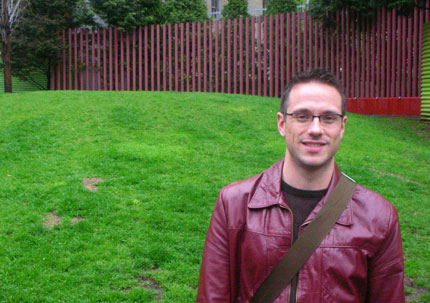
 Catch the show Friday and check out his new album called
Catch the show Friday and check out his new album called  Out my (Seattle) way, local composer and Seattle Weekly columnist Gavin Borchert this week offered up something titled “
Out my (Seattle) way, local composer and Seattle Weekly columnist Gavin Borchert this week offered up something titled “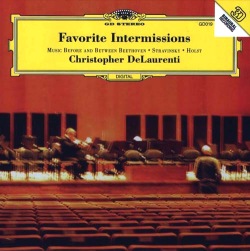 My pal
My pal  Rilke Songs; The Six Realms; Horn Concerto
Rilke Songs; The Six Realms; Horn Concerto






 Quartetset; Quiet Time
Quartetset; Quiet Time

 It’s that time of the year again, folks, when composers around the world turn their attention to Los Angeles, with bated breath, waiting to hear who is, in fact, the greatest composer in America and the world this year. Who has advanced the art, who has raised the human spirit, who has earned his (yes, pretty much always, it’s his) place in musical history.
It’s that time of the year again, folks, when composers around the world turn their attention to Los Angeles, with bated breath, waiting to hear who is, in fact, the greatest composer in America and the world this year. Who has advanced the art, who has raised the human spirit, who has earned his (yes, pretty much always, it’s his) place in musical history.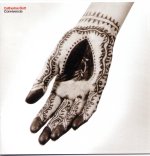 The
The